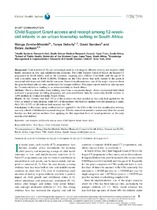| dc.contributor.author | Zembe-Mkabile, Wanga | |
| dc.contributor.author | Doherty, Tanya | |
| dc.contributor.author | Sanders, David | |
| dc.contributor.author | Jackson, Debra | |
| dc.date.accessioned | 2017-12-01T11:11:09Z | |
| dc.date.available | 2017-12-01T11:11:09Z | |
| dc.date.issued | 2014 | |
| dc.identifier.citation | Zembe-Mkabile, W. et al. (2014). Child Support Grant access and receipt among 12-week-old infants in an urban township setting in South Africa. Global Health Action, 7: 25310 | en_US |
| dc.identifier.issn | 1654-9716 | |
| dc.identifier.uri | http://dx.doi.org/10.3402/gha.v7.25310 | |
| dc.identifier.uri | http://hdl.handle.net/10566/3289 | |
| dc.description.abstract | BACKGROUND: Cash transfers (CTs) are increasingly used as a strategy to alleviate poverty and improve child
health outcomes in low- and middle-income countries. The Child Support Grant (CSG) is the largest CT
programme in South Africa, and on the continent, targeting poor children from birth until the age of 18
with a monthly sum of R300 (USD30). Evidence on the CSG shows that early receipt of the grant is
associated with improved child health outcomes. Since its implementation, one of the major concerns about
the grant has been take-up rates, particularly for younger children. This paper reports results on take-up rates
for 12-week-old infants residing in an urban township in South Africa.
METHODS: This is a descriptive study utilising data from a community-based, cluster-randomised trial which
evaluated a programme providing pregnancy and post-natal home visits by community health workers to
3,494 mothers in Umlazi township, South Africa.
RESULTS: At the 12-week visit, half (52%) of the mothers who had enrolled in the study had applied for the
CSG on behalf of their children, while 85% of the mothers who had not applied were still planning to apply.
Only 38% (1,327) of all children had received the CSG.
CONCLUSIONS: In this study, many mothers had not applied for the CSG in the first few months after delivery,
and only a third of children had accessed the grant. Further research is needed to understand what the current
barriers are that prevent mothers from applying for this important form of social protection in the early
months after delivery. | en_US |
| dc.language.iso | en | en_US |
| dc.publisher | Co-Action Publishing | en_US |
| dc.rights | 2014.#2014 Wanga Zembe-Mkabile et al. This is an Open Access article distributed under the terms of the Creative Commons CC-BY
4.0 License (http://creativecommons.org/licenses/by/4.0/), allowing third parties to copy and redistribute the material in any medium or format and to remix,
transform, and build upon the material for any purpose, even commercially, provided the original work is properly cited and states its license. | |
| dc.subject | Cash transfers | en_US |
| dc.subject | Child health | en_US |
| dc.subject | Take-up rates | en_US |
| dc.subject | Child Support Grant | en_US |
| dc.subject | South Africa | en_US |
| dc.title | Child Support Grant access and receipt among 12-week-old infants in an urban township setting in South Africa | en_US |
| dc.type | Article | en_US |
| dc.privacy.showsubmitter | FALSE | |
| dc.status.ispeerreviewed | TRUE | |

